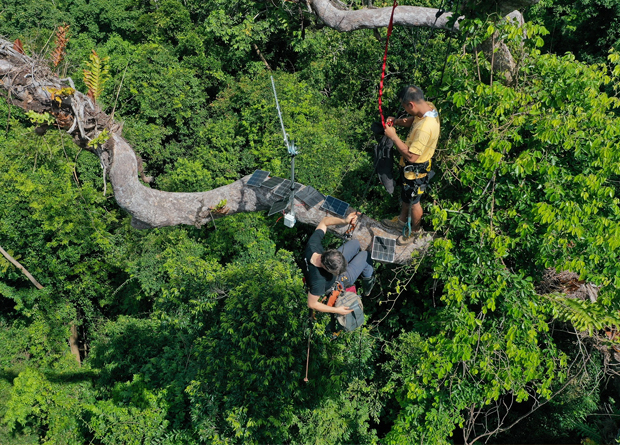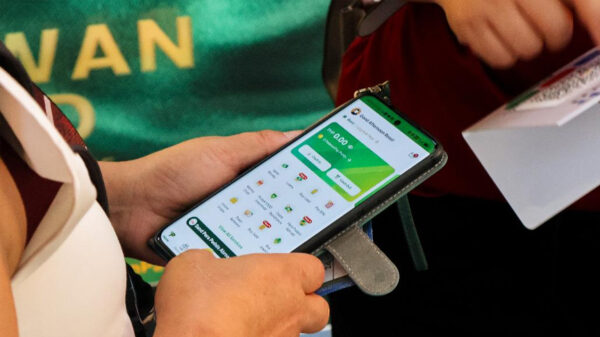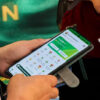Mobile phones can now help save endangered rainforests of the Philippines.
In a landmark initiative, the Department of Environment and Natural Resources (DENR), PLDT wireless unit, Smart Communications, Inc. (Smart), and Huawei Technologies Philippines (Huawei), are collaborating to pilot test an Internet of Things (IoT) solution that taps mobile technology to detect and record rainforest sounds that can help prevent illegal logging and poaching activities in the country’s rainforests.
At present, the solution has been successfully deployed to five DENR-designated areas in Palawan which is recognized as the “last ecological frontier” of the country.
Developed by US-based NGO, Rainforest Connection (RFCx), the innovation makes use of old cell phones, to monitor and record ambient sounds of priority forest areas identified by the DENR. The bio-acoustics are then uploaded to a cloud service using Smart connectivity. The information can be accessed via the Rainforest Connection mobile application.
Information on the mobile app may be used by key community stakeholders to interpret patterns of forest activity and take corresponding action in affected areas.
Real-time listening post for the country’s forests
The solution makes use of old cellphones that are installed in strategic areas of the rainforest. Powered by solar panels and wireless connectivity, the mobile devices are repurposed as “Rainforest Guardians” or listening posts for sounds of the forest.
Audio recordings of the Rainforest Guardians are accessible to DENR forest rangers, who also receive real-time alerts on sounds of chainsaws, trucks and other sounds of forest destruction.
“The DENR welcomes this collaboration between the government and the private sector to help protect the country’s forest cover. This supports DENR Secretary Roy Cimatu’s resolve to level up the enforcement mandate and capability of DENR by employing technology to complement our current systems,” said Nilo Tamoria, Executive Director of the DENR Environmental Protection and Enforcement Task Force.
“This initiative highlights the important role of technology in nation-building. As the country’s leading digital services providers, PLDT and Smart are in a unique position to leverage on our platforms and technical expertise, to aid in the protection of the environment. It is our hope that this significant step will not only benefit policy makers and forest workers, but also surrounding communities who rely on rainforests for food, shelter and livelihood,” said Manuel V. Pangilinan, PLDT Chairman and Chief Executive Officer.
“At Smart, we are championing eco-efficiency through various programs that reduce the impact of our operations, people, and products on the environment. On top of that, we have always been at the forefront in using technology to support meaningful initiatives that protect our forests to curb the devastating effects of climate change,” said Alfredo S. Panilio, President and CEO of Smart and Chief Revenue Officer of PLDT.
Telco partnership, a world first
This is the first time the innovation has been rolled out in the Philippines, and the first time that a telco has been tapped by Rainforest Connection to serve the platform’s connectivity requirements.
As the first Philippine telco partner, Smart provided wireless connectivity to all the designated pilot sites in Palawan, namely: Cadlao Island, Maranlao and Pasadena in El Nido; and New Guinlo and Pancol in Taytay.
“As the pioneer connectivity partner for this initiative, we have been able to successfully demonstrate a complete and interoperable ecosystem for Rainforest Connection’s innovation—that which connects the key government unit, the primary NGO, a technology partner, and a telco, to help guard the rainforests in the Philippines. Our support for this initiative underscores our commitment to provide services that promote environment stewardship and sustainability,” said Chaye Cabal-Revilla, PLDT SVP & Group Controller and concurrent PLDT Group Chief Sustainability Officer.
“The dedication of the local DENR forest rangers in Palawan is known worldwide, as are the unique challenges and dangers they have faced in protecting this last frontier of Filipino wilderness from logging and environmental threats. Huawei and Smart teamed up to give RFCx an opportunity to help these brave men, and now, with their new technical advantage, the forest is always connected to its protectors, 24/7, thanks to the reliable and extensive Smart network covering the island.“ said Topher White, CEO, Rainforest Connection (RFCx).
Mobile telephony helps curb deforestation
The solution has been successfully rolled out in Brazil, Costa Rica, Ecuador, Indonesia, Peru, Romania and South Africa.
Results have also been promising since its implementation in the Philippines. After the pilot rollout of Rainforest Connection in the country, several alerts of illegal logging in Palawan were verified and foiled by forest rangers.
“This initiative highlights our seriousness in helping create a more sustainable future for families, communities, and the country,” Cabal-Revilla conclude.









































































































